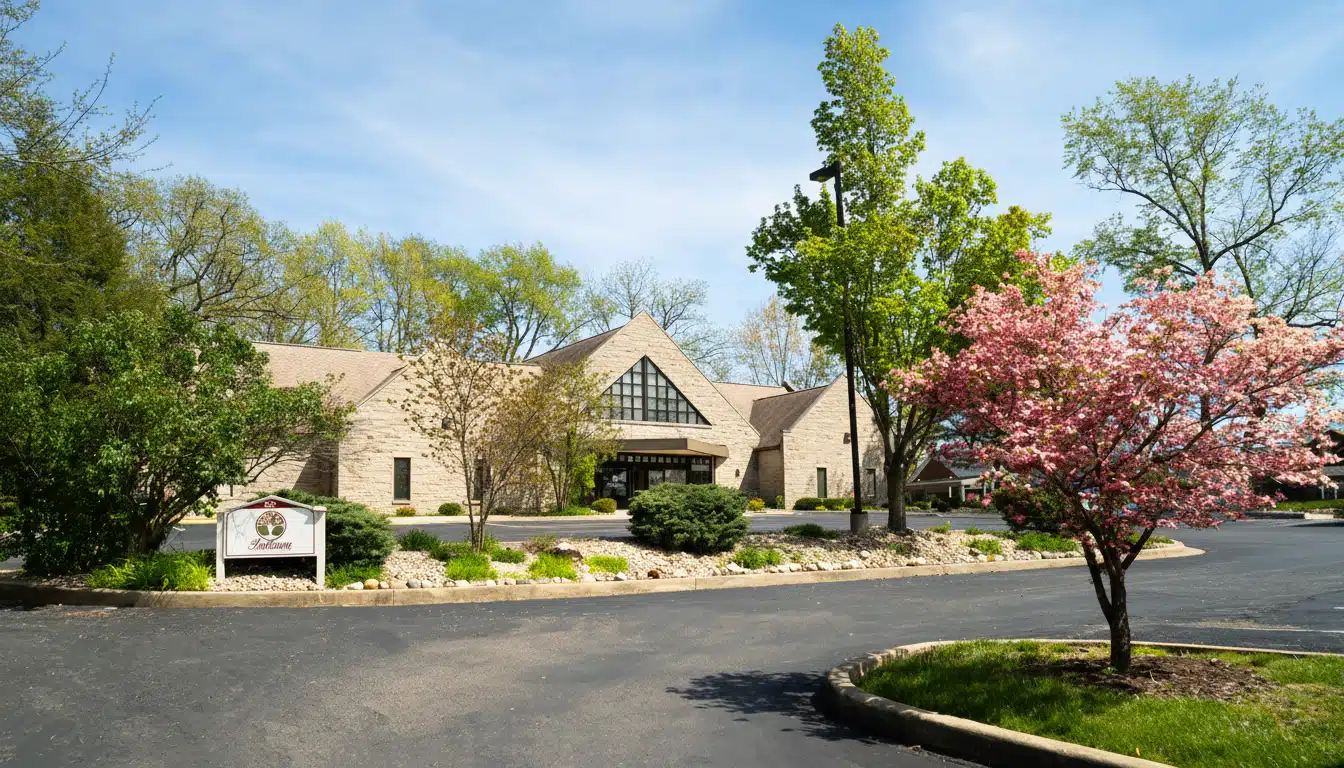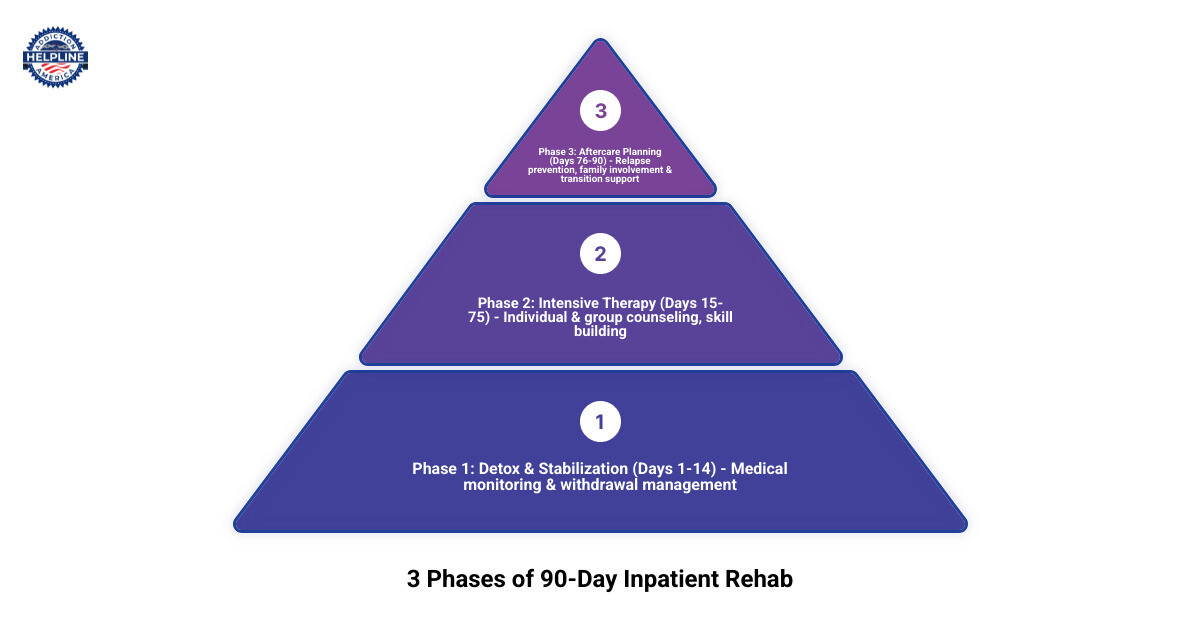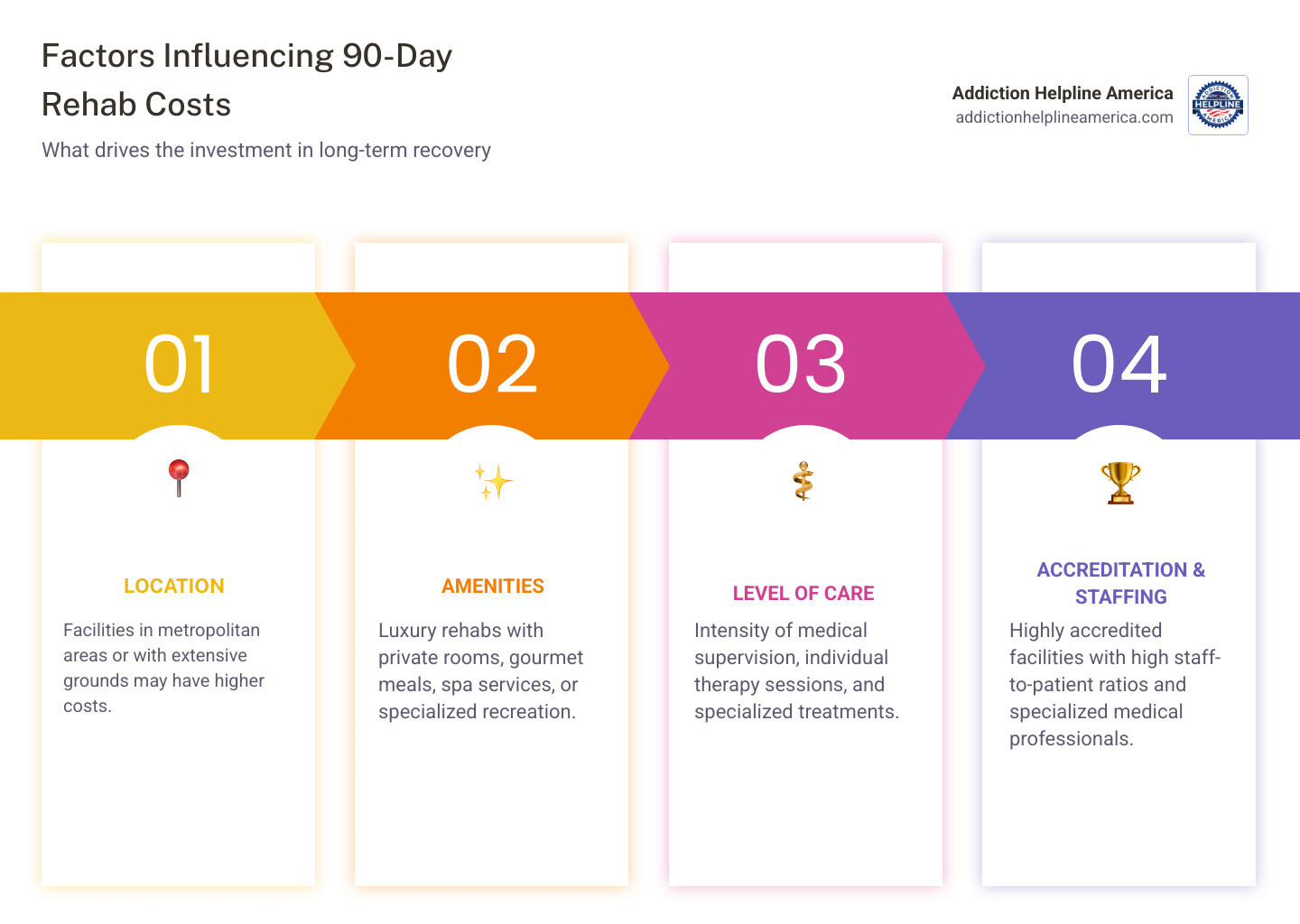
Understanding Your Options: What 90-Day Inpatient Rehab Near Me Really Means
90 day inpatient rehab programs near me are residential treatment facilities where you live for about three months while receiving intensive, 24/7 care for substance use disorders. Here’s a quick overview:
Quick Overview:
- What it is: A structured, residential treatment program lasting approximately 90 days
- Who it’s for: Individuals with severe addiction, a history of relapse, or co-occurring mental health conditions
- What’s included: Medical detox, individual and group therapy, medication-assisted treatment, and aftercare planning
- Cost range: $12,000 to $60,000, though many insurance plans cover a significant portion
- Success rates: Research shows programs lasting 90 days or longer result in significantly better long-term recovery outcomes
How to Find Programs Near You:
- Contact your insurance provider to verify coverage
- Search online directories for accredited facilities
- Ask your doctor or therapist for referrals
- Call treatment centers directly to ask about services
- Visit facilities in person when possible
If you’re facing addiction, help is available. A 90-day inpatient program offers the time, support, and professional care needed to break free from substance dependency and build a foundation for lasting recovery.
At Addiction Helpline America, we connect individuals with 90 day inpatient rehab programs near me and across the country. We provide confidential, 24/7 guidance to help you find the right treatment. We understand this first step takes courage and are here to make the process as clear and supportive as possible.
Must-know 90 day inpatient rehab programs near me terms:
Why a 90-Day Program? The Science-Backed Benefits of Extended Care
Does the length of a rehab program really matter? The honest answer is yes—and research backs this up. The 90-day duration isn’t arbitrary; it’s based on solid science about how the brain heals and how deeply ingrained behaviors change.
Addiction is a complex condition affecting brain chemistry, behavior, and relationships. The National Institute on Drug Abuse (NIDA) has found that programs lasting 90 days or longer consistently show significantly higher success rates for sustained sobriety compared to shorter stays.
Why does this extra time matter so much? The first few weeks of treatment focus on detox and stabilization. A 90-day program allows for deeper therapeutic work to begin after this initial phase. You move past crisis management to practice coping skills until they become second nature, working through underlying issues with sustained professional support.
Key benefits of a 90-day program include:
- Addressing Underlying Issues: Many people have co-occurring disorders like anxiety, depression, or trauma. A 90-day program provides the necessary time for dual diagnosis treatment, which dramatically increases the chance of long-term recovery.
- Building Genuine Coping Skills: The extended duration helps you build and practice new ways to handle stress, emotions, and relationships without substances in a safe environment.
- Effective Relapse Prevention: You have more time to identify personal triggers and develop robust strategies to manage them, allowing new, healthy neural pathways in the brain to strengthen.
| Program Duration | Primary Focus | Intensity | Target Population |
|---|---|---|---|
| 30-Day Rehab | Initial detox & stabilization, introduction to therapy | High | Mild substance use disorders, first-time treatment |
| 60-Day Rehab | Detox, deeper therapy, coping skill development | Very High | Moderate substance use disorders, some relapse history, need more time |
| 90-Day Rehab | Comprehensive detox & therapy, addressing underlying issues, robust skill-building, aftercare planning | Extremely High | Severe substance use disorders, co-occurring disorders, chronic relapse, need for stable environment |
Signs You or a Loved One Might Need Extended Care
A longer program is strongly suggested in certain situations:
- History of relapse: If shorter programs haven’t led to sustained sobriety, more time and deeper work are likely needed.
- Severe or long-term substance use: Years of dependency can’t be undone in a few weeks. The brain and behavioral patterns need more time to heal.
- Co-occurring disorders: If you’re dealing with both addiction and mental health challenges like anxiety, depression, or PTSD, integrated treatment over an extended period is essential. More info about Alcoholic Complete Guide.
- Lack of a supportive home environment: A 90-day residential program provides a safe, structured space away from triggers and other negative influences.
- Previous shorter treatments were unsuccessful: This often indicates that more time was needed for comprehensive care, not a lack of willpower.
Who is a 90-day inpatient rehab program near me best suited for?
Extended care is particularly beneficial for:
- Individuals with dual diagnosis: The integrated approach addresses both addiction and mental health conditions simultaneously. More info about PTSD Inpatient Treatment explores this further.
- People with chronic substance dependency: This population needs the intensive, sustained care that a 90-day program provides to rebuild their lives.
- Those needing a strong sober support network: Three months in a residential community helps build genuine, lasting connections with peers.
- People requiring significant time away from triggers: A protected healing space allows you to develop new patterns before facing a triggering environment again.
- Individuals committed to profound personal change: The extended timeframe supports the deep work required to build a genuinely new way of living.
A Look Inside: What to Expect During a 90-Day Program
Knowing what to expect during a 90 day inpatient rehab program near me can ease anxiety about this brave decision. While every center is unique, they share core components.
The process begins with a thorough intake and medical assessment to create a personalized treatment plan. If needed, medically supervised detoxification (detox) is the first step, managing withdrawal symptoms safely to prepare you for therapy. For more on safe detox, check out Best Detox Facilities Near Me.
After detox, you’ll join a structured, therapeutic community. This supportive environment, free from outside triggers, allows you to focus entirely on recovery.
A Typical Daily Schedule
A typical day is thoughtfully designed to promote healing. It’s a mix of therapy, education, self-reflection, and wellness activities.
- Mornings: Often start with meditation or yoga, followed by group therapy sessions to share experiences and learn from peers.
- Afternoons: Usually include individual counseling for one-on-one work, educational workshops on addiction and life skills, and fitness or recreational activities.
- Evenings: May involve support groups like 12-step meetings (AA or NA) and personal time for journaling or reflection.
Throughout the day, nutritious meals are provided to support physical healing.
Types of Therapies and Treatments Offered
A quality 90 day inpatient rehab program near me uses a mix of evidence-based and holistic therapies to treat the whole person—mind, body, and spirit.
Common therapies include:
- Cognitive Behavioral Therapy (CBT): Helps you identify and change harmful thought patterns and behaviors linked to substance use.
- Dialectical Behavior Therapy (DBT): Teaches skills to manage strong emotions and improve relationships, often used for co-occurring disorders.
- Medication-Assisted Treatment (MAT): Combines medications with therapy to ease cravings and withdrawal for opioid or alcohol addiction.
- Family Therapy: Helps mend relationships, improve communication, and build a supportive home environment.
- Holistic Therapies: Includes yoga, meditation, art, or music therapy to reduce stress and improve overall well-being.
- Trauma-Informed Care: Creates a safe environment to heal from past trauma, a common root cause of addiction.
These therapies work together to build a strong foundation for lasting sobriety. Want to learn more about different therapies? Check out Treatment Therapy.
Understanding the Cost and Payment Options for 90-Day Rehab
Worrying about the cost of a 90 day inpatient rehab program near me is normal, but it’s an investment in a healthier, substance-free future. The cost of treatment is often less than the long-term financial and personal costs of untreated addiction.
According to the National Center for Drug Abuse Statistics (NCDAS), costs for 60 to 90-day programs typically range from $12,000 to $60,000. This price varies based on factors like location, amenities, level of care, and facility accreditation.
Fortunately, these costs don’t have to be a barrier. There are many ways to make treatment accessible:
-
Insurance Coverage: Under the Affordable Care Act (ACA), most private and public plans (Medicaid/Medicare) cover addiction treatment. Coverage details vary, so it’s crucial to verify your benefits with your provider or the rehab’s admissions team. More info about Rehab Insurance Coverage.
-
Private Pay: Paying directly (self-pay) is always an option, and some facilities may offer a discount for it.
-
State-Funded Programs: Many states offer low-cost or free treatment for eligible residents through government grants.
-
Financing Options: Many rehab facilities offer payment plans or work with third-party healthcare loan companies to make costs more manageable.
-
Sliding Scale Fees: Some non-profit or state-funded centers adjust the cost of treatment based on your income.
Investing in a 90 day inpatient rehab program near me is an investment in your life and well-being. At Addiction Helpline America, we can help you explore all your options and steer the financial side of treatment with confidence.
How to Find Reputable 90-Day Inpatient Rehab Programs Near Me
Finding the right 90 day inpatient rehab program near me can feel overwhelming, but there are proven ways to identify quality facilities.
Start your search using online directories and by asking for professional referrals from your doctor or therapist. They can recommend trusted programs that fit your specific needs.
Once you have a list of potential centers, verify their credentials. Ensure they are licensed by the state and, ideally, accredited by a reputable body like The Joint Commission, which signifies high standards for care and safety. You can check for accreditation on their website.
Ask admissions counselors these key questions:
- What is your staff-to-patient ratio?
- What credentials do your therapists and medical staff hold?
- Do you offer specialized treatment for co-occurring disorders?
- What does a typical day look like?
- How do you involve family members in treatment?
- What kind of aftercare support do you provide?
- What is your approach to relapse prevention?
If possible, take a facility tour (in-person or virtual). This gives you a feel for the environment and staff that a website cannot. At Addiction Helpline America, we offer free, confidential guidance to help you steer this process and find a program that matches your needs.
How do I choose the right 90-day inpatient rehab program near me?
Choosing the right program means finding the best fit for your unique situation.
- Assess Personal Needs: Choose a program that addresses your specific challenges, such as dual diagnosis (addiction with depression or PTSD), trauma-informed care, or Medication-Assisted Treatment (MAT). More info about PTSD Inpatient Treatment.
- Consider Location: Decide if staying close to home for family support or seeking a complete change of scenery away from triggers is better for you. We can help you explore options in any state. More info about Rehab California.
- Look for Specialized Programs: Consider programs custom to specific groups, like gender-specific, young adult, or veterans’ programs, which can improve comfort and effectiveness.
- Read Reviews and Testimonials: Check reviews from former patients to look for patterns of compassionate staff, effective therapy, and a supportive community.
- Verify Evidence-Based Practices: Ensure the program uses proven therapies like Cognitive Behavioral Therapy (CBT), Dialectical Behavior Therapy (DBT), and MAT.
- Inquire About Aftercare Planning: A good program plans for your long-term success from day one, offering connections to outpatient services, support groups, and sober living options.
We know this is a lot to consider. That’s why Addiction Helpline America exists. Our team provides free, 24/7 support to help you sort through these factors and connect with a program that truly fits your needs.
Life After Rehab: Planning for Long-Term Sobriety
Completing a 90 day inpatient rehab program near me is a major accomplishment, but it’s the start of a lifelong recovery journey, not the finish line. The transition back to daily life is critical, which is why a comprehensive aftercare plan is essential. It acts as a roadmap and support system for maintaining your sobriety.
Developed during your time in rehab, your aftercare plan is custom to your individual needs. Key components often include:
-
Continuing Care: Many individuals transition to less intensive outpatient programs, such as an Intensive Outpatient Program (IOP) or Partial Hospitalization Program (PHP). These provide ongoing therapy and support while allowing you to live at home and reintegrate into your community. More info about Outpatient Drug Rehab Complete Guide.
-
Sober Living Homes: These residences offer a structured, drug-free environment, acting as an invaluable bridge between inpatient rehab and independent living. They provide peer support and accountability in a community of others committed to sobriety.
-
Support Groups: Groups like Alcoholics Anonymous (AA) and Narcotics Anonymous (NA) have been cornerstones of recovery for decades. They offer ongoing peer support, sponsorship, and a proven framework for living sober.
-
Alumni Programs: Many rehab facilities offer alumni programs that provide a built-in network of support through regular check-ins, events, and connections with peers who share your experience.
-
Building a Sober Social Network: Actively cultivating relationships with individuals who support your sobriety is crucial. This may involve joining recovery-focused groups, pursuing new hobbies, or reconnecting with supportive friends and family.
-
Ongoing Therapy: Continuing individual or group therapy after rehab helps you process new challenges as they arise, reinforce coping skills, and address any issues that could threaten your sobriety.
The goal of aftercare is to provide the tools and support needed to steer life’s challenges without returning to substance use. While the transition can be daunting, lasting recovery is achievable with the right plan and continued effort. At Addiction Helpline America, we’re here to support you not just in finding treatment, but also in planning for what comes next.
Frequently Asked Questions about 90-Day Rehab
When considering a 90 day inpatient rehab program near me, it’s natural to have questions. Here are the most common ones we hear, with the honest answers you need.
Does insurance cover a 90-day rehab program?
Yes, most insurance plans cover substance abuse treatment as an essential health benefit under the Affordable Care Act. However, coverage varies widely based on your specific plan, your network status, and your deductible. Some plans may cover the full 90 days, while others may only cover a portion.
It’s crucial to verify your benefits by calling your insurance provider or speaking with the rehab facility’s admissions team. They can explain exactly what your plan covers. At Addiction Helpline America, we can also help you understand your insurance options and connect you with programs that accept your coverage. More info about Rehab Insurance Coverage.
Can I keep my job if I go to a 90-day rehab?
Yes, it’s often possible to protect your employment. The Family and Medical Leave Act (FMLA) provides eligible employees with up to 12 weeks of unpaid, job-protected leave per year for serious health conditions, which includes addiction treatment. If you qualify, your employer cannot fire you for attending rehab.
Additionally, the Americans with Disabilities Act (ADA) may offer protections by treating addiction as a disability in certain cases. We recommend speaking confidentially with your HR department to understand your specific rights. Don’t let fear of job loss prevent you from getting the help you need.
What happens if I relapse after a 90-day program?
Relapse can be part of the recovery process; it does not mean you or the program failed. It is a sign that your recovery plan needs adjustment, not that you should give up.
If you relapse after completing a 90 day inpatient rehab program near me, here’s what to do:
- Reach out for support immediately. Contact your sponsor, therapist, or a trusted person in your support network. Don’t let shame keep you isolated.
- Reassess your recovery plan. Work with a professional to identify triggers, learn from the experience, and strengthen your strategies.
- Use alumni support. Many rehabs offer alumni programs or “tune-up” sessions to help you get back on track without judgment.
- Remember your progress. A relapse doesn’t erase the work you’ve done. What matters most is that you keep moving forward.
At Addiction Helpline America, we’re here for you throughout your recovery journey. If you need help—for the first time or after a setback—we can connect you with the right resources, confidentially and at no cost.
Your Path to Lasting Recovery Starts Today
Choosing to enter a 90 day inpatient rehab program near me is a courageous decision to reclaim your life, rebuild relationships, and refind yourself.
This extended time in treatment provides the time and tools necessary to build a strong foundation in sobriety. Unlike shorter programs, a 90-day stay allows you to dig deeper, addressing not just the addiction but also underlying issues like trauma, mental health challenges, and learned behaviors.
Recovery is a journey, not a destination. With the right support, evidence-based treatment, and a commitment to your healing, lasting sobriety is absolutely within reach. You don’t have to do this alone.
Taking the first step is often the hardest. Concerns about treatment, cost, or time away from responsibilities are normal, but they shouldn’t stop you from seeking help.
At Addiction Helpline America, our mission is to connect you with the right treatment program for your unique situation. We provide free, confidential, personalized guidance 24/7. We’re here to listen without judgment and help you explore your options. Find the right treatment program for you.
You deserve a life free from the grip of addiction. Your journey to lasting recovery can start today. You just have to take that first step.
Our helpline is 100%
free & confidential
If you or someone you care about is struggling with drug or alcohol addiction, we can help you explore your recovery options. Don’t face this challenge alone—seek support from us.
Programs
Resources
Will my insurance
cover addiction
treatment?
We're ready to help
Find the best
drug or alcohol treatment
center
Are you or a loved one struggling with addiction? Call today to speak to a treatment expert.

















